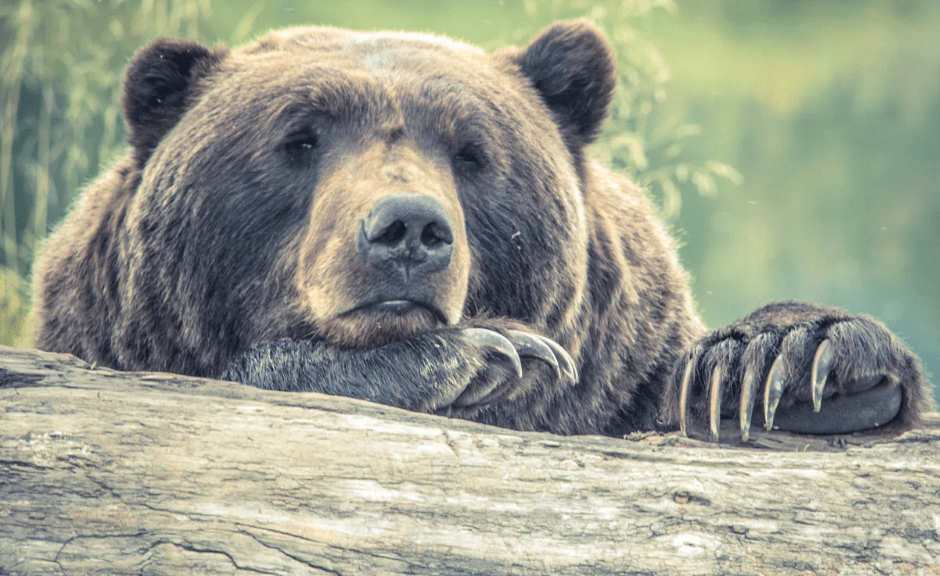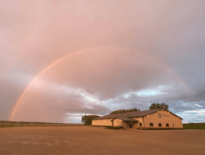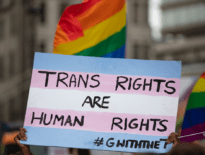
Man vs. Bear and the Privileges of Safety
I’ve been thinking a lot about the privileges of safety since this whole social media question started making the rounds on social media. You know, the one about whether you’d rather meet a man or a bear or whatever other variation in the woods (if you haven’t heard, many women when offered this question have been enthusiastically choosing the bear, and explaining their experiences and reasons for this). It makes sense that I’d been thinking about this, because the very question in how so many people answer it betrays a feeling of being profoundly unsafe—usually with the entity in question that is NOT the bear. Nonetheless, there are some aspects to this I haven’t seen fully dealt with, so I’m gonna spend a little time unwrapping a few of them in this post.
My Background and Standpoint
As always, I’m coming at this from the perspective of a former pastor’s kid from a right-leaning largely white moderate denomination who went on to become a communication scholar who teaches and writes focusing on stress, trauma, and conflict communication.
As it happens, I also worked for two summers in undergrad in National Parks.
Both of those parks had lots of bears.
So yeah, as I’ve been thinking through this bear vs. human question and looking at everyone’s responses, I can’t not read this question through the idea of the privileges of safety.
All Humans Are Equal, But Some Have More of the Privileges of Safety Than Others (Oh Wait)…
The thing is that lots of people, depending on where they fit in our world’s complicated social hierarchies, are more keenly aware of dangers from particular humans or groups of humans than others are.
This becomes connected to gender, sure, as it often has been in this particular “man vs. bear” variation, but definitely doesn’t just stop there.
Not Just about Gender and Assault (Though Definitely about That!)
I saw (and shared a post on AS) by Ally Henny, for instance, that drew attention to the fact that Black women may find white women more dangerous than bears.
Learning about the Privileges of Safety Related to Race as a White Person…
Which reminded me of the time a few years back when I, an ignorant white person, FINALLY, after many close relationships with Black people and a lot of time listening to Black students, realized from reading a book by Ta-Nehisi Coates that a Black man is 8—count them, 8—times more likely to die (I think it was by violence, specifically?) than a white man.
I also remember learning about The Talk that Black folks give their young children about how to deal with it if they are confronted with the police.
I remember learning about how entire travel books were written for Black Folks just to help them avoid the dangers of white towns.
Not Always Easy to Fully Empathize with These Kinds of Things
So yeahhhhh it’s one thing to read Uncle Tom’s Cabin and Harriet Tubman and Roll of Thunder, Hear My Cry as a middle schooler. It’s another entirely to realize, as a white person who grew up fairly ignorant of the modern-day lived experiences of Black people in this country we all share, that a Black person might have good reason to be fearful around people of my skin color.
I mean, it’s one thing to watch a movie or two about the problem of lynchings and think of that as decades ago, another entirely to have students write an extra credit paper telling you about how they knew six people that got shot at home just this semester.
I’ll Always Be Experientially Ignorant to Some Degree…But I Can Do What I Can
The thing is, I know no matter how much I’ve listened, I’m still missing layers and layers to this particular fear and the entirely too often valid reasons for it.
Because THAT has simply not been my lived experience. Because of a trick of birth, I was born with fair skin instead of dark skin, and that, as the poet says, has made all the difference—at least in this one aspect of being safer because of having lighter skin.
Sometimes You Don’t Choose Your Privileges of Safety…
It is an unearned privilege, this privilege of safety related to my skin color and how society looks at that skin color.
And since I know that now, I’m determined to do what I can not to abuse that privilege.
Sometimes We and Those We Know Are Parts of These Types of Problems
But that doesn’t mean I don’t know other a whole bunch of other white people don’t abuse that privilege all the time to continue to hurt Black people in a multitude of ways.
And let’s be clear—because I continue to miss layers of this, I too am likely part of this particular problem in lots of ways.
We’re all socialized into lots of unhealthy aspects of unhealthy systems, and it takes a lot of work to sort through them.
Using Intersectionality As Grounds for Empathy and Action
The thing is that I can glimpse these other layers a little bit because privileges of safety tend to be intersectional—that is, even while my white skin tends to make me safer in some ways, other parts of my identity and experiences have made me less safe in other ways.
And sometimes the privileges can be at least somewhat moved away from, as it happens. Even my willingness to speak up on half of groups that I’m not a part of makes me a little bit less safe than I would have been had I not made that choice.
(Even so, there’s a difference between privileges of safety when you choose to give them up, and those the person does not have a choice about.)
So I find it helpful to think through the things I DO know about the way I and others feel unsafe and see what I can do to remove unnecessary stress and unsafety from both me and other groups.
Listening Is So Key As Well
I also listen to voices in groups that tend to feel unsafe, without trying to overgeneralize too much from one or two voices or experiences, necessarily. I find it really important to be open to recognizing systemic inequities of power and safety while also realizing that people are individuals, and because of intersectionality and different experiences, every person’s concerns might be a little different.
The Importance of Hearing a Variety of Stories about Unsafety
Speaking of different experiences, I think it’s really important to note that those play a huge role in all of this. There are a lot of common things that come up when listening to the man vs. bear stories, for instance—many of them involve creepy men and/or sexual assault, unfortunately—but everyone has different experiences.
Like the #metoo movement, these stories have illustrated the above points, as well as how very many stories of unsafety there unfortunately are. Note that this also applies to questions around abuse in church contexts too–I spoke about why all churches should take vulnerability toward abuse seriously here.
And those stories, as with the issues with racism and white supremacy and the unsafety involved with that, aren’t just about those individual experiences.
Not Just about Individuals Though
They’re also about the way that society protects those who abuse their power to threaten and abuse people.
So Important to Keep Advocating for a Safer World for Us All–Especially the Vulnerable
If we all did a much better job, however we are able, to speak up assertively to hold people accountable for such abuses, and were persistent in those efforts—well, let’s just say I have this dream that the inequities around the privileges of safety just wouldn’t be as strong at some points, if we all kept working on the issue.
The thing is that man vs. bear isn’t about gender identity, not really. Nor is it about race. Not really.
Nope, it’s about people who abuse their power and privilege to hurt others in a wide variety of ways, when bears just mostly want to keep to themselves in the woods.
A Final Charge
Go Team #AssertiveSpirituality! Let’s continue to do what we can, where we are, with whatever we’ve got to keep speaking up against the toxic stuff toward a healthier, safer world for us all. We can do this thing.
Want to help keep this work going? It’s been 6 (!!!) years of this project, and I finally have tip jars set up at Venmo and PayPal so you can help keep the lights on and such (THANK YOU for whatever you can do!). Here’s the info:
Venmo: @assertivespirituality
PayPal: https://www.paypal.com/donate/?hosted_button_id=Q2QWKELCNATBE
Looking for more resources toward speaking up for what’s right and dealing with the conflict that results?
Boy, do we have got a free “Assertive Spirituality Guide to Online Trolls” for you. It actually helps you with conflict both online and off. To get it, sign up for our email newsletter (either in the top bar or by checking the appropriate box when commenting on this article). Once you’ve confirmed your email address, we’ll send you the link to the guide in your final welcome email. You can unsubscribe at any time, but we hope you’ll stick around for our weekly email updates. As soon as we feasibly can we’re hoping to offer more online courses and other support resources for those advocating for the common good, and if you stay subscribed, you’ll be the first to know about these types of things when they pop up.
Want More Specific Help Applying This Kind of Thing? Message Me at the Assertive Spirituality Facebook Page.

